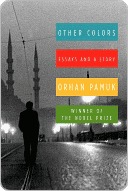
Other Colors
Essays and a Story
کتاب های مرتبط
- اطلاعات
- نقد و بررسی
- دیدگاه کاربران
نقد و بررسی

September 3, 2007
Though the latest book from Nobel Prize-winning Pamuk (Istanbul, Snow) is a standard late-career essay collection, it makes clear the reasons behind the Turkish author's acclaim. Eschewing flash and flourish, Pamuk's style is plain, simple and persuasive-but therein lies its subtle power, well represented over more than 75 pieces divided into sections like "Living and Worrying" and "Politics, Europe, and Other Problems of Being Oneself." Self-reflection and cultural evolution emerge often as twin themes, as in his consideration of the Thousand and One Nights: "In those days, young Turks like me who considered themselves modern viewed the classics of eastern literature as one might a dark and impenetrable forest." These concerns lead naturally to political considerations, such as his conclusion that "the lies about the war in Iraq and... secret CIA prisons have so damaged the West's credibility in Turkey... it is more and more difficult for people like me to make the case for true western democracy in my part of the world." There's humor as well; in "Giving Up Smoking," a smoking cab driver begs Pamuk's pardon: "He was opening the window. 'No,' I said, 'keep it closed. I've given up smoking.'" Also included are musings on his own books and a short story, "To Look Out the Window." Disarmingly honest, Pamuk refuses to give in to melodrama or stylistic quirks, giving his feeling and frustration crystalline clarity and lasting weight.

Starred review from September 15, 2007
More than 75 short essays and interviews make up this collection, in which Nobel prize winner Pamuk passionately shares his thoughts and insights about growing up, his understanding and appreciation of the Mediterranean and Turkish cultures and their role in world politics, and his love of writing and literature. For Pamuk, words are like colors in a painting. Several of the essays deal with his writing of and interviews about "My Name Is Red"; others deal with his visit to New York City and his thoughts about what is real and what is imitative. All the essays provide insight into the author's private and public worlds and in some way reveal a vital imagination. The final three sections include extensive interviews with Pamuk that appeared in the "Paris Review" in May 2004 and April 2005; this is followed by an autobiographical story titled To Look Out the Window. The final piece, My Father's Suitcase, is the Nobel lecture he gave last December, in which he attempts to answer the question asked of all writers: Why do you write? "Other Colors" answers this question vividly. Enthusiastically recommended. [See Prepub Alert, "LJ" 5/1/07.]Herbert E. Shapiro, Empire State Coll. of the SUNY at Rochester
Copyright 2007 Library Journal, LLC Used with permission.

September 15, 2007
Leave it to Nobel laureate Pamuk to turn what could have been simply a solid essay collection into a spiraling and meditative sequence of memories, dreams, ideas, and reflections. By gathering together brief lyrical essays, portraits of his family, various speeches, literary essays, interviews, and responses to events, including the terrible earthquake that struck Istanbul in 1999, Pamuk allows readers more access to his inner world than most memoirists. Pamuk is humble about what he calls the clerkish aspect of writing, the requisite patience and long hours of solitude. But he is also exalted by his belief that it is only through novels that we can truly understand what life is like for others. Put on trial for having publicly denigrated Turkish identity, Pamukwrites crisp political pieces. But clearly he is happiest re-creating the atmosphere of his beloved Istanbul, reporting on his travels, and responding to favorite writers. There is at once wistfulness and grandeur in this beautiful book, a mix of pain and pleasure that resides at the heart of the human experience.(Reprinted with permission of Booklist, copyright 2007, American Library Association.)

























دیدگاه کاربران